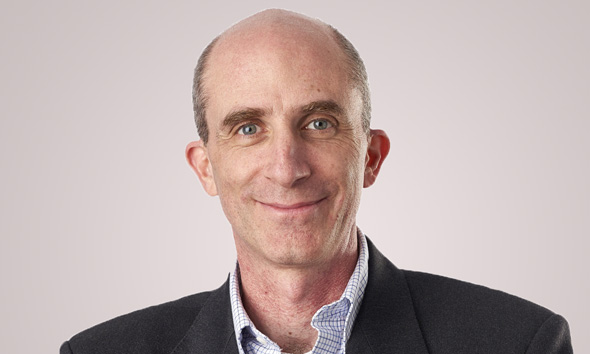Dede Goldschmidt, Samsung Catalyst: Data ends up acting like motor traffic
Speaking to CTech as part of a special investor survey, David (Dede) Goldschmidt, Head of Samsung Catalyst Fund, said “the strength of the startup ecosystem is in its ability to steer talent to new, rising needs and domains”
“We’re seeing radical shifts in core infrastructure to accommodate all of that change. Datacenters that manage behind-the-scenes data and compute are changing; they’re becoming much more data-centric—the onslaught of data has shifted the focus to efficient data movement and management,” says David (Dede) Goldschmidt, Vice President, Managing Director, at Head of Samsung Catalyst Fund.
Goldschmidt shared his views in CTech’s exclusive investor survey conducted with participants of the Poalim Hi-Tech and Calcalist Road Show event. The event brought together dozens of startups who pitched their venture to more than 20 leading Israeli investment groups and investors.

What trends are you most excited about investing in?
Much has been said about how Covid-19 accelerated digitization. We all experience this on a daily basis, as we became accustomed to consuming services online and via mobile apps. The combination of enterprise transformation, consumer behavioral changes, and the explosion of data is disrupting multiple industries—from banking to healthcare to entertainment and beyond.
We’re seeing radical shifts in core infrastructure to accommodate all of that change. Datacenters that manage behind-the-scenes data and compute are changing; they’re becoming much more data-centric—the onslaught of data has shifted the focus to efficient data movement and management.
Data ends up acting like motor traffic. If you suddenly see increased traffic volume, you won’t solve new traffic bottlenecks by installing new stop lights. You would need a coordinated arrangement of new roundabouts, widened highways, and efficient public transportation—so that traffic never has to stop.
Similarly, in the digital world, analytics engines and artificial intelligence systems are fed by incredibly growing amounts of data to personalize our social media feeds, give us the best shopping coupons, or optimize our financial services. The challenge is gradually expanding from pure computation to moving toward efficient data delivery, needed to feed these hungry inference engines.
I’m excited about opportunities to innovate in data center architectural disruptions — at all layers of the stack, from semiconductors chipsets to systems and up to orchestration software. At the Samsung Catalyst Fund, we also look at disruptive ideas in AI / ML, 5G / networking, Autotech, sensor technologies, Quantum Computing, computing in general and more.
What’s your latest, most exciting investment?
That’s like asking which of my kids is the most exciting! Internal conviction and excitement are needed for each and every investment. Every single one of them is exciting in a different way.
Which industries seem well-positioned to thrive long term? What companies are you excited about (whether in your portfolio or not), which founders?
The exciting thing about this line of work is that it exposes innovation, and the potential for industry disruption, before the inflection point. The strength of the startup ecosystem is in its ability to steer talent to new, rising needs and domains. Hence, we saw “hype cycles” of telecom companies in the 90s, then storage in the 1st decade of this century. Then came the auto-tech wave and AI in the 2010s, and now gaming, fintech/insurtech, and the ever-present cybersecurity and digital health/medical tech fields.
We don’t need to predict which industry/sector is going to be the next big thing; whatever it is, you can bet that the Israeli tech community will adjust and adapt to competitively address rising needs.
What is your approach to VC involvement in the management of the companies they invested in?
It’s challenging to start a venture and run it over time. Also, early-stage companies often need to pivot from their original plans when a business or industry circumstances change. It requires resilience and stamina to sit in the driver’s seat, powering into the headwinds… but if successful, those eventually become tailwinds!
As strategic investors, we offer help and support and also try to leverage our corporate resources, know-how, and networking to help our portfolio companies thrive. We apply a “1+1=3” strategy; the independent success of our portfolio company is very important to us, and we always try to see how incremental value can be created, fostering mutual growth and benefits.
We try to wrap up every meeting with the questions, “What else can we do to help you? What else do you need to be successful?”
There’s a fine line between being involved and being in charge—we always let the startup team steer the ship, even as we offer navigational guidance. As much as we are committed and involved, and as proactive as we may be as board members and investors, we have to remember that we are more like coaches or even fans—and we are not in the starting lineup. There are limits to what we can or should do as investors to make a new venture successful.
What should be the level of a fund's involvement in solving a company's HR problems?
Every portfolio company has an “owner” within our fund; the individual that drove the deal and will always be available for the respective company, and represent their interests.
Share with us your golden tip for an entrepreneur presenting a pitch.
Try to study the background of your audience, their experience, success and failures, ahead of your pitch.
Listen and try to learn from every piece of feedback you receive. Investors may have visibility into other companies or startups that operate in adjacent space, and when they offer advice, take it into consideration.
Hold on to your conviction and don’t be easily derailed, even when facing negative feedback.



